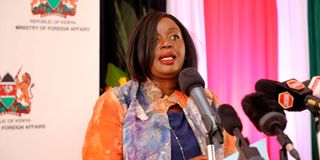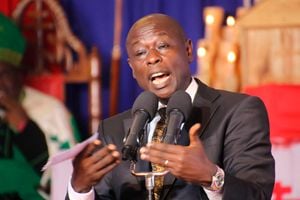Kenya finally accedes to AU charter against coups

Foreign Affairs Cabinet Secretary Raychelle Omamo.
Kenya has joined other African countries who have signed and domesticated a treaty against coups, rebellions and other unconstitutional changes in government.
At the African Union (AU) on Friday, Foreign Affairs Cabinet Secretary Raychelle Omamo deposited Kenya’s acceptance of the Charter on Elections, Governance and Democracy (ACDEG), more than a year after the National Assembly approved the treaty, and nearly 14 years since Kenya signed on it.
Ms Omamo said the depositing of instruments, formally known as accession, will “solidify Kenya's support for the AU's aspiration for an Africa of good governance, democracy and respect for human rights and the rule of law.”
It means Kenya had accepted to use the Charter either as a local law or guide to enhancing its governance. The Charter, passed by the AU member states in January 2007 only came into force in 2012, after the required minimum 15 member states ratified it.
AU Constitutive Act
Kenya signed on the document in 2008 but had not endorsed it until 2020 when the National Assembly approved it.
Alongside the AU Constitutive Act, the Charter is one of the basic laws for the continental bloc against coups or what it calls unconstitutional changes in government.
Countries who ratify it accept to implement decisions reached by the AU, including rejection of any coups, extradition of coup plotters to face justice or supporting any other sanctions against a member state that topples a democratically elected government.
The document says it promotes values of democracy, rule of law and human rights and nearly all AU member states have signed on to it, but only 35 have ratified it. In the region, Kenya will join Ethiopia and Rwanda among the countries that have ratified the document.
Its provisions say member states who sign it also declare to strengthen organs of the AU, eliminate discrimination, promote sustainable development and promote supremacy of constitutions.
Transparent governance
It also calls on members to promote a culture of transparent governance, strengthen institutions, and promote civic rights. It also includes building independent national electoral bodies, timely and fair elections including participation by both gender, youth and elderly, mechanisms to address electoral malpractices, a free media and a code of conduct for politicians at elections
Critics of the charter say its outright provision that coup plotters be barred from taking part in subsequent elections or extradited or sanctioned, may entrench dictatorship.
Nairobi acceded to the Charter even as Africa faces a new round of coups and coup attempts. Mali, Guinea, Burkina Faso and Sudan are all dealing with the challenge of returning to transition after the army toppled the respective civilian governments.
In Chad, the death of President Idriss Deby in April on the battlefront, just days after he won a controversial new term, saw the military take over power. The junta named Deby’s son Mahamat Idriss as the interim President.
This week, Guinea Bissau also faced a coup attempt, in which President Umaro Sissoco Embaló linked it to drug cartels.





